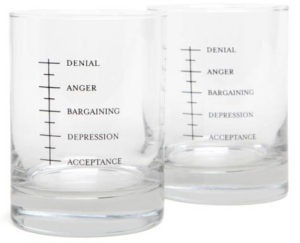This reflection is based on Matthew 14:13-21.
 I couldn’t help but laugh out loud when a good friend shared this picture with me.
I couldn’t help but laugh out loud when a good friend shared this picture with me.
At first glance, they look like laboratory beakers–the type that come imprinted with measurement lines, those that you probably last laid your hands on way back in High School Chemistry–unless of course, you went on to train as a Chemist.
Upon closer inspection, however, they turn out to be actual drinking glasses–except that they have those measurement graduations. But instead of the usual units of measurement like ounces or cups, these glasses have no less than Kubler-Ross’ five stages of loss and grief. You’ve heard it before: denial, anger, bargaining, depression, and acceptance.
They’re appropriately called “Good Grief glasses.” Their ad makes it quite clear that they’ve been designed specifically for alcohol consumption, complete with precise measurements for the amount of booze guaranteed to fix any emotional issue. Note that the earlier you are in your mourning (e.g., denial or anger), the more booze you’re supposed to drink!
But doesn’t this picture remind you of that common expression about the half-full/half-empty glass? Both, it seems to me, offer us some kind of advice on what to do when we find ourselves facing a problem. Both tell us that there are times when we can’t do much about what life hands out to us. But while these Good Grief glasses (designed tongue-in-cheek, for sure!) tell us simply to drink away and forget, the saying–which, like many proverbs, is not without its own wisdom–challenges us instead to examine the way we look at things, especially our pessimism or optimism: Are we obsessing too much about the problem (the half that’s empty), or are we able to shift our focus on the blessings we already have (the half that’s full)? In other words, when faced with a major problem, don’t forget to count your blessings and be grateful for what you already have even if it’s not everything you want.
It seems to me that our Lord is showing us a third way. In today’s Gospel story of the feeding of the five thousand, our Lord tells his disciples (a little mischievously, I imagine), “Give them some food yourselves.” Their response is, of course, one of incredulity: “Five loaves and two fish are all we have!” they protest to him. We know the rest of the story: The Lord asks for those very five loaves and two fish, and performs a miracle that not only fed every single person in that crowd, but also virtually provided everyone with a doggy bag to take home.
What has the Lord done here? He has certainly not gone the way of the Good Grief glasses; by no means does he opt to flee from the problem at hand or to forget about it–certainly not by sedating himself! He doesn’t agree when the disciples suggest that he send the crowd–and the problem–away. He also refuses to look at the glass as “half-empty” and in fact, gives thanks to the Father for the five loaves and two fish that the disciples have managed to find. But he does more: He sees and accepts those very constraints, but also somehow manages to recognize their possibilities, and actually takes action to turn those possibilities into reality.
There is a valuable lesson here for us. We may not have the power to perform such miracles, but we do have the power to look for possibilities in things which others dismiss as constraints–if we choose to do so. The Lord teaches us not to turn a blind eye to constraints (vs. the Good Grief glasses), not even to look away from them (vs. the saying), but precisely to focus on them and rack our brains about what is possible with those very constraints.
I’ve met a number of people whose first, knee-jerk–and exasperating–reaction to any new idea is: “It can’t be done.” Of course it can’t be done–but hopefully only until now! The problem with truly new and innovative ideas is that they haven’t been done yet because no one has actually believed they could be done. If we focus too much on constraints and don’t spend enough time exploring possibilities, we will never get things done–much less new things.
Our Lord today challenges us not just to be optimists who choose to see the half that’s full, but also to be optimistic realists who also see the half that’s empty and wonder what we can do to fill that half up. And since we are no miracle workers, another common expression comes in quite handy here: “Just do your best, and God will do the rest.”
So next time you see a half-empty glass, don’t just remind yourself to say “thanks” for the half that’s full. Think about the half that’s empty and ask yourself about its possibilities. What else and what more can be done?
The Jesuits have a term for it: magis, meaning “more.” You can’t do magis without dreaming of possibilities. One discovers the magis in the empty places of our lives.
3 replies on “HALF-FULL &/OR HALF-EMPTY”
When we do our ‘best’ (no matter how insignficant our efforts may seem to ourselves)despite the odds, and leave the rest to God, He never fails to amaze us with his overflowing grace.
Yes, I like that insight of seeing the half-empty glass as one of possibilities; of thinking outside the box (in this case, the glass). Thank you for giving me a new meaning to this often-quoted adage.
The gospel today tells me that before God acts He wants us to give our best first, even
if we produce the equivalent of 2 fishes and 5 loaves only.